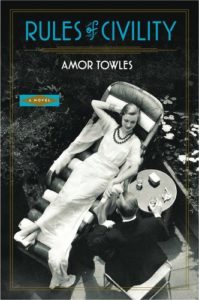 Rules of Civility is perfection in world-building, the art of constructing a believable and engrossing fictional world for the characters to inhabit. Nineteen-thirties Manhattan is long gone but Towles brings it back to glittering life and that is the main enjoyment of the novel.
Rules of Civility is perfection in world-building, the art of constructing a believable and engrossing fictional world for the characters to inhabit. Nineteen-thirties Manhattan is long gone but Towles brings it back to glittering life and that is the main enjoyment of the novel.
The characters who inhabit that world are compelling, at least for the first two-thirds of the book. The first-person narrator, Katey Kontent (Miss Kontent is improbably pronounced ‘misconent,’ we learn) is a working-class twenty-one-year-old who inserts herself into the wealthy upper classes after being picked up in a bar by a Gatsby-esque prince charming. She and her friend Eve, who does the same (it’s a twofer for the prince), lead the reader through the money-soaked pages in a loose and drunken triangle reminiscent of The Sun Also Rises.
I totally bought the voice and character of Katey. Having written several female main characters myself, I know how hard that is for a male author to do. Towles’ touch is subtle. In Katey’s world, what gets noticed most are clothing, jewelry, food, and relationships. For the guys, like Prince Tinker, life is tinted instead by guns, boats, money, war, and social power. Fair? Maybe not, but for the time and place portrayed, these subtle shadings were enough to backlight a compelling female lead.
This is a literary novel, so be forewarned, nothing happens. The only dramatic tensions are petty resentments. Characters yearn for nothing and no antagonist appears. It’s just people living their lives in sparkling prose.
In the last third, main character Katey dissolves. Sophisticated, composed and reflective in the main part of the book, she suddenly throws a hissy-fit and becomes arbitrarily moody and directionless for the duration, destroying the piston that drove the engine of the story. Other characters, most notably prince charming, likewise suddenly change course without sufficient motivation and virtually evaporate from the pages, so for the last section, the character magic is gone and one is left only with clever writing, which is never enough, in my opinion, to sustain a story (excepting Nabokov, of course). An attempted Gatsby-esque denoument falls flat because nothing was at stake.
An epilog, which seems an afterthought, tells ‘what happened’ to each major character, an attempt to nail down an ending that says “…and the world continued to turn despite the self-centered mini-dramas of each life.” That takeaway reminds me of McCann’s Let the Great World Spin, but is much less effective. I think Towles just ran out of steam. Still, the first two-thirds is a great read.
Towles, Amor (2011). Rules of Civility. New York: Penguin (335 pages).
